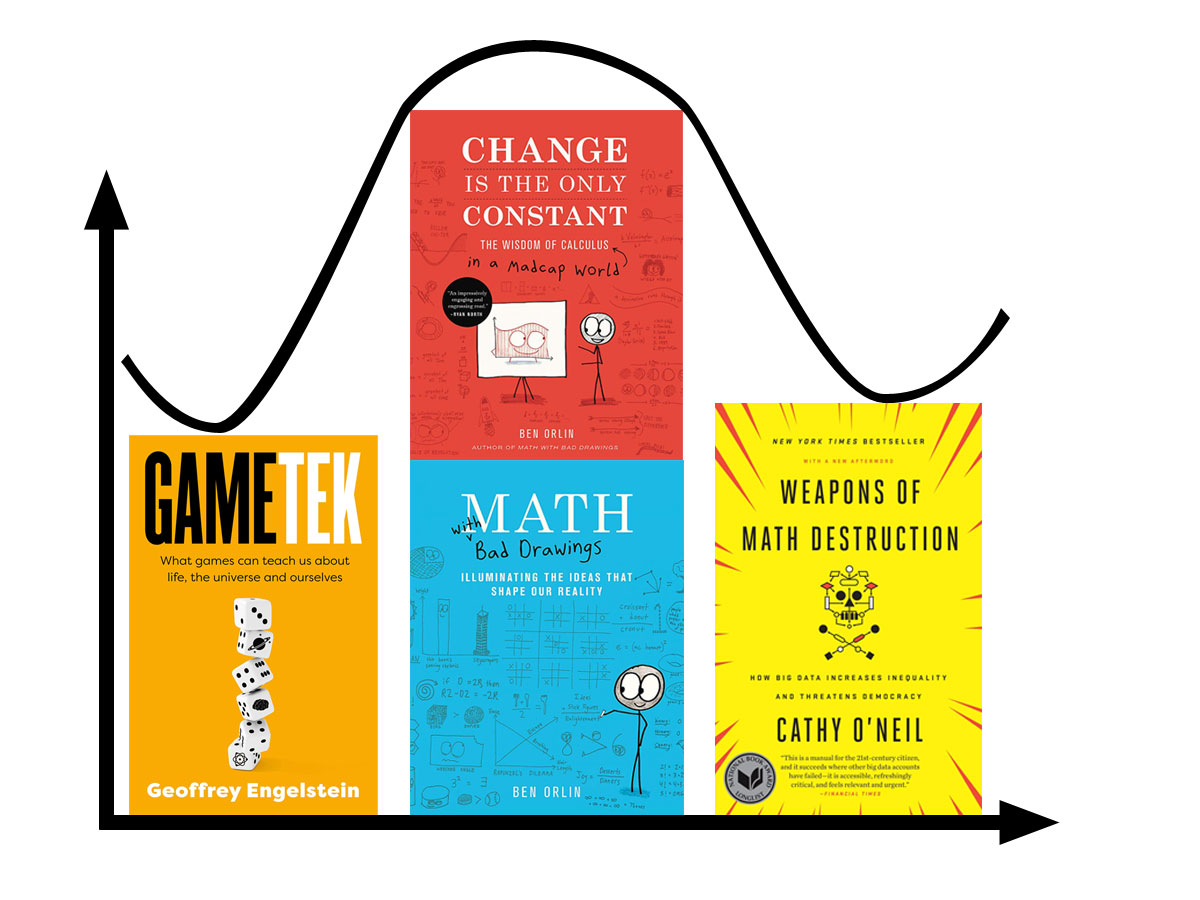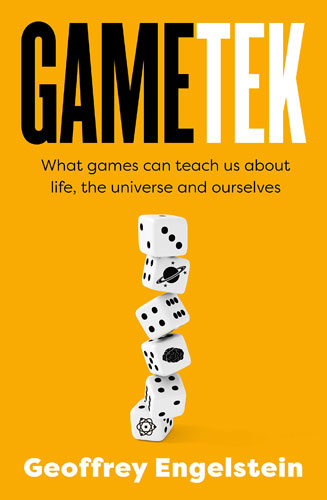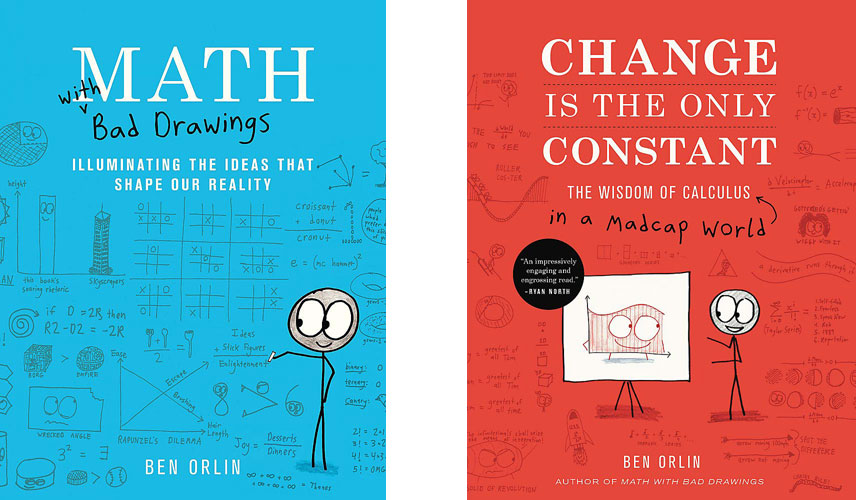Today’s Stack is a little smaller, because non-fiction always takes me a bit longer to read than fiction, but today’s topic is math. Wait, don’t go! These books are less about learning specific equations or solving algebra problems, and more about how mathematical concepts are applied in the real world, and the effects they can have on us. These books show how math can be fun, or beautiful, or dangerous.
They’re just a portion of the stack of math-related books I’ve got on my shelf. I actually majored in math in college, in large part because I’d always been pretty good at it and because I wasn’t sure what I wanted to do after college. I figured math would be a good foundation for jumping into something else later. As it turns out, I haven’t spent much time since then doing anything that would be considered higher math, but it’s still something that gets my attention—if not always the subject itself, then at least the method of thinking that is involved.
GameTek: What Games Can Teach Us About Life, The Universe and Ourselves by Geoffrey Engelstein
If you’re a fan of tabletop games, the name Geoffrey Engelstein may be familiar to you: he’s the designer of a few games, such as the Space Cadets series. He’s also the creator of the GameTek podcast (from which this book was adapted), which started out on the Dice Tower podcast and is now on Ludology. This book includes 19 essays (plus an epilogue), assembled from the hundreds of episodes of the podcast, about games and how they intersect with the real world in fascinating ways. The book explores probability, entropy, patterns, psychology, and more. Among the curious things I learned about was the liturgy—a tax in ancient Greece that was intended to be paid by the wealthiest citizens, which also included a challenge option: if you were taxed but felt somebody else was wealthier than you, you could challenge them, and they had the option of either accepting the tax themselves (because they agreed with you) or swapping all of their possessions with you (because they disagreed). In another chapter, Engelstein explains the odds of shuffling a deck of cards so that its arrangement has never before been seen in the history of cards. (Spoiler: the odds are very good.)
Each chapter is an independent topic so you don’t have to read it straight through, though I did. I found that games are a great way to dive into topics about math and science, and math and science are cool ways to approach games. I can’t say that the book will make me better at playing games, but it helped me look at them from new perspectives.
Weapons of Math Destruction: How Big Data Increases Inequality and Threatens Democracy by Cathy O’Neil
This book was published in 2016 and has been on my list, so I finally picked up a copy at the bookstore and then read through it over the course of several months. (You may have seen it mentioned in a few of my Stack Overflow columns.) Cathy O’Neil digs into the algorithms that are increasingly used to make decisions from healthcare to financial services to policing. We often have the expectation that a computer algorithm should have less bias and prejudice than a human, but this book shows why that isn’t always the case. Algorithms that are designed with faulty assumptions can magnify and multiply those problems at an alarming rate, and one of the worst parts is that it’s impossible to appeal to an algorithm when you feel its decision isn’t accurate.
O’Neil defines her “weapons of math destruction (WMDs)” as mathematical models that are opaque, unfair (often with pernicious feedback loops), and are easily scaled up so that they affect a huge number of people. She shows how targeted advertising preys on those who can least afford it; how systems cause vicious cycles that keep poor people from getting better jobs or affording housing or staying healthy. It’s an eye-opening book, but the sad truth is that it really doesn’t feel like things have necessarily improved much since the book was first published. WMDs continue to proliferate, and those who get caught in their clutches generally have a very hard time getting back out. This is a book that I wish our elected leaders would read, because it will take some big changes to protect the data about us that is often used in these mathematical models.
Math with Bad Drawings and Change Is the Only Constant by Ben Orlin
This pair of books takes you on a journey through math and calculus that’s light on equations—instead, Orlin explains the ideas behind the math in ways that are illuminating and (dare I say it?) fun to read. His drawings are stick figures with big eyes—crude, but with funny captions, and they’ve even drawn in my 7-year-old, who has been reading parts of the books over my shoulder.
Math with Bad Drawings is divided into sections like geometry, probability, and statistics, and each chapter explores different aspects of the topic—sometimes with more scientific rigor, sometimes with a hefty dose of silly humor. For instance, one chapter looks at probability as seen by various different types of people, from weather forecasters (who don’t want people to be disappointed if it rains with a 20% chance) to action movie stars (a 0% chance means “impossible” and yet Tom Cruise has a 6 out of 6 completion rate so far). Another chapter on probability shows how something as seemingly simple as flipping a coin 46 times in a row can lead to totally unique results (kind of like the shuffling cards question Engelstein explores in GameTek), and then compares that to human genetics and why non-twin siblings are often similar but not identical.
Change Is the Only Constant focuses on calculus, but explains all the concepts visually and with examples that help make it intuitive. Now, you won’t learn how to do derivatives and integrals from reading this book, but you’ll get a sense of what’s going on. You’ll see how acceleration and velocity and position are related to each other, and the weird magic of cutting things into tiny little pieces and assembling them back into a whole again.
If you’ve ever been intimidated by math, you may appreciate these books—they help make math more user-friendly.
Disclosure: Except where noted, I received review copies of these books.
My Current Stack
Aside from the math books above, I recently read an advance copy of City Spies: Golden Gate by James Ponti, a sequel to City Spies (which I mentioned in this Stack Overflow). It’s about a group of talented kids who work for MI6, and is a fun middle grade spy book. More on that a little closer to the release date in March!
I also figure it may be time to check in with my fellow GeekDads and GeekMoms about our 2020 Reading Resolutions, made back in January before we realized we would be spending most of the year dealing with things like lockdowns and digital learning. My Goodreads reading challenge this year was particularly ambitious (I set a goal of 150 books, since I include everything but picture books in that count) and it doesn’t look like I’m going to reach that. So stay tuned for that, as well as our favorite books of the year, as we close out the year.







